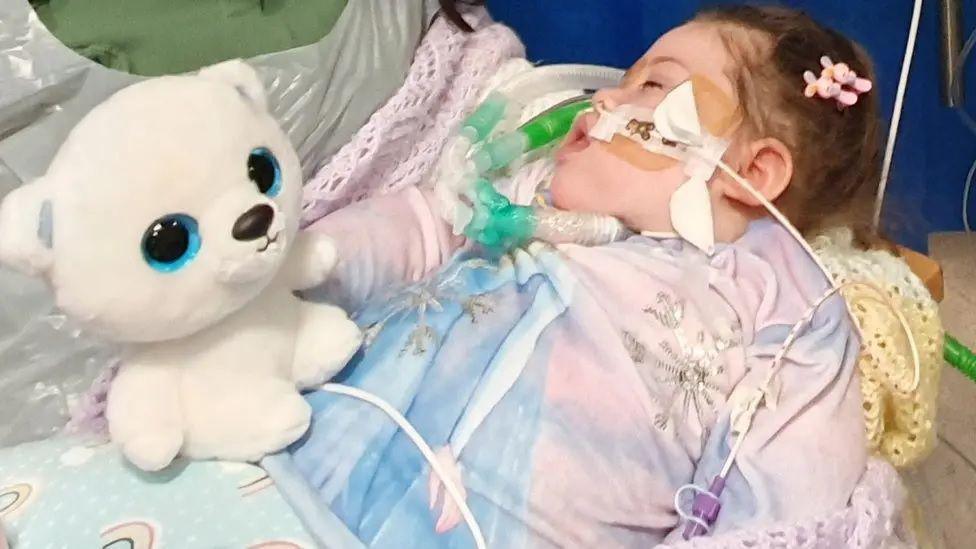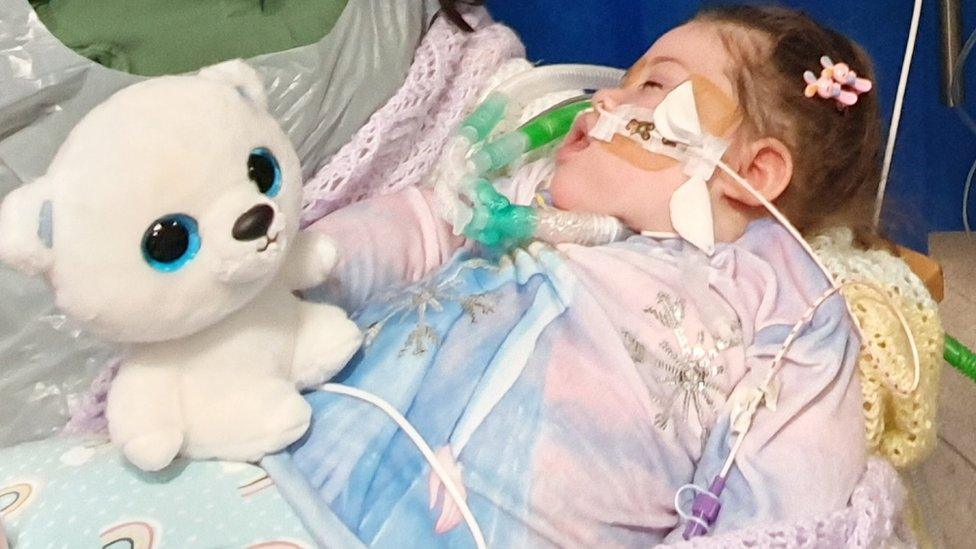Parents raise care concerns over toddler's death

Alta Fixsler's life support was withdrawn in 2021 after a High Court decision
- Published
The parents of a two-year-old girl who suffered a "catastrophic" brain injury after an emergency Caesarean have alleged there were failings in how clinicians handled their daughter's birth, an inquest has heard.
Alta Fixsler from Salford died in 2021 when her life support was removed after her ultra-orthodox Jewish parents lost a High Court battle with Manchester University NHS Foundation Trust.
An inquest into her death heard she was born prematurely by Caesarean on 23 December 2018 after her mother Chaya Fixsler was taken to St Mary's Hospital in an emergency.
She said she was not given adequate support to manage pregnancy complications, but hospital bosses said her care was “appropriate”.
Alta was born 34 weeks into the pregnancy after her mother experienced a placental abruption, a serious condition which led to the need for an emergency c-section.
The baby was born without a heartbeat and required immediate resuscitation, leading to a severe brain injury.
Doctors said she had no prospect of recovery and was in constant pain, with the injury ultimately leading judges to rule her ventilation should be withdrawn.
Her Hasidic Jewish parents had argued this was against their religious beliefs, but the High Court ultimately ruled it was in the two-year-old's best interests.
"From the moment we laid eyes on Alta, we knew she was special," they said in a joint statement.
"Despite her medical condition, her presence was a beacon of hope and resilience, she taught us the depth of unconditional love and the true meaning of faith."
'Panic'
Giving evidence via live video link and through an interpreter, Mrs Fixsler said she had been assessed as high-risk due to previous pregnancy issues and her medical condition.
She said she visited the hospital several times while pregnant over issues with bleeding, but was told "as long as the baby is growing everything is okay".
The parent told the inquest they believe if clinicians had taken her medical history seriously she would have been hospitalised earlier, and said no one had mentioned the risk of a placental abruption.
Dr Sarah Vause, a consultant who was involved in Mrs Fixsler pregnancy care, said she was provided with the "appropriate support".
Mrs Fixsler suffered "severe" bleeding alone at home on the morning of 23 December, and was taken to St Marys Hospital by Hatzola, a Jewish ambulance service.
The inquest heard hospital staff report delays in Mrs Fixsler arriving at St Mary's and the family agreeing to proceed with the c-section contributed to issues arising from her birth.
But the family said the delay was caused by the need for a blood test before the operation.
Her husband Mr Fixsler told the inquest staff were in a "panic", and there was a lot of "doctors coming in and out".
He gave evidence at Manchester Coroner's Court court carrying a teddy bear wearing a t-shirt bearing pictures of his daughter.
“I think we would have been in another place if things were explained, if we knew earlier we could have asked her to be hospitalised earlier or had private treatment."
The family have also argued Alta's later transfer from intensive care at St Mary's to Royal Manchester Children's hospital was inappropriate for her needs.
But Prof Simon Mitchell, a consultant at St Mary's who was involved in her care, told the inquest there was a comparable level of care between the two.
The inquest is set to continue on 1 October.
Listen to the best of BBC Radio Manchester on Sounds and follow BBC Manchester on Facebook, external, X, external, and Instagram, external. You can also send story ideas to northwest.newsonline@bbc.co.uk, external
Related topics
- Published19 October 2021

- Published6 October 2021

- Published23 August 2021
